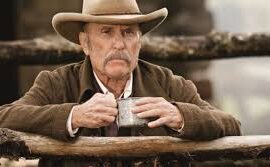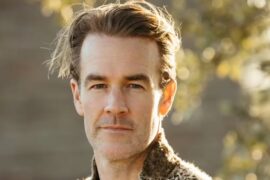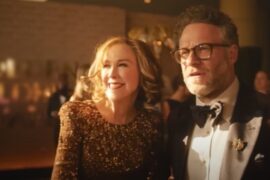Mad Men creator Matthew Weiner wrote a sterling exit for Robert Morse.
Towards the end of the series’ run, Morse’s character — ad firm patriarch Bertram Cooper – dies at home shortly after witnessing the best ad line ever uttered on television: Neil Armstrong’s “That’s one small step for (a) man, one giant leap for mankind.”
“Bravo,” said Bertie before leaving this earth himself.
Don Draper (Jon Hamm) is still reeling from the news when he turns around at work and sees a ghost: the old man breaking into a soft shoe (more of a soft sock) and singing, “The Best Things in Life are Free.”
Now Morse has left this earth behind, passing away April 20 in Los Angeles, a few weeks before his 91st birthday.
I spoke with him in 2016 in Pasadena, Calif., where he was attending an FX network event at the lobby bar of the Langham Huntington Hotel during a Television Critics Association press tour event.
advertisement
At the time Morse was playing Dominick Dunne in “The People vs. OJ,” the first season of American Crime Story.
“I had a wonderful time doing him,” said Morse, who wore false teeth (to cover his own gap-toothed grin) and big round glasses to play Dunne. The actor was 84 at the time.
We talked about that Mad Men exit, and while the series had “a damn fine choreographer” in Mary Ann Kellogg, Morse confirmed Weiner did allow him to add a few steps. With Mad Men set during Morse’s ’60s heyday on Broadway, the result (seen in the video, above) remains poignant and powerful.
Often described as “impish,” the diminutive actor was a sensation in the 1961 Broadway production of “How to Succeed in Business Without Really Trying,” repeating the performance in the 1967 feature film. It was a part that put him in a rarified ’60s mix as a brash youth who could wink his way past the older generation.
Morse told me he saw the 2011-12 revival starring Harry Potter’s Daniel Radcliffe.
“I sat there and watched the show and I said, ‘Shit, did I do that show?’ It was tremendous.”
I told him my son Daniel was in a high school production of the musical back home in Brampton, Ont. Morse, who had five children altogether, told me he had a son Charlie even younger than my son Dan (with second wife, Carole, to whom he was married 33 years).
He good-naturedly grumbled that the teenager was always borrowing his car.
“I never see him,” said Morse. “I go to bed at 10:30 and he’s just going out.”
The actor won his first Best Actor Tony for “How to Succeed…” and a second for playing author Truman Capote in the 1989 one-man-play “Tru.” He won an Emmy award for the 1992 American Playhouse adaptation of “Tru” on PBS. A Screen Actors Award came later as part of the Mad Men ensemble.
The Massachusetts native’s TV credits date back to small parts on The Phil Silvers Show and Alfred Hitchcock Presents in the 1950s. Pre-“How to Succeed…,” he was a standout in the 1965 satirical feature “The Loved One” opposite Rod Steiger, John Gielgud, Jonathan Winters, Milton Berle and Liberace.
An early ’70s stint on the ABC soap All My Children seemed a mis-step. By the ‘70s and ‘80s he was doing Love American Style, The Love Boat and Murder, She Wrote before a string of voice-over roles for animated fare my kids grew up watching, including Rugrats.
Mad Men put him back in the spotlight in his eighties, allowing him to take a well-deserved bow for a lifetime of showing exactly how to succeed in showbusiness. Bravo, Mr. Morse.






